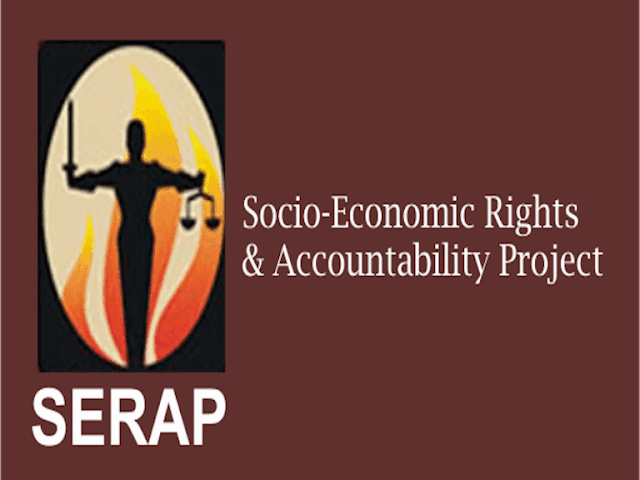In a bold move to uphold fiscal responsibility and protect the interests of ordinary Nigerians, the Socio-Economic Rights and Accountability Project (SERAP), a prominent Nigerian civil society organization, has filed a lawsuit to block a proposed salary increase for Nigerian politicians. The legal action, lodged at the Federal High Court, seeks to challenge what SERAP describes as an unjustifiable and economically insensitive proposal, particularly in light of Nigeria’s ongoing economic challenges. The suit has sparked widespread debate, with many Nigerians questioning the timing and rationale behind the proposed pay hike for public officeholders, given the country’s pressing socio-economic issues.
Background: Nigeria’s Economic Context and Public Sentiment
Nigeria, Africa’s most populous nation and a major oil-producing country, has been grappling with significant economic difficulties in recent years. High inflation rates, a depreciating currency, and rising unemployment have placed immense pressure on the livelihoods of ordinary citizens. According to data from the National Bureau of Statistics, Nigeria’s inflation rate stood at 33.4% in mid-2025, with food inflation reaching even higher levels, exacerbating the cost-of-living crisis. The removal of fuel subsidies in 2023 and subsequent economic reforms have further strained household budgets, leaving many Nigerians struggling to afford basic necessities such as food, transportation, and healthcare.
Against this backdrop, the proposal to increase salaries for politicians has ignited public outrage. Nigerian lawmakers, judges, and other top public officials are already among the highest-paid in the world when compared to the country’s per capita income. Reports suggest that a Nigerian senator earns approximately ₦14 million (about $8,500) monthly, excluding allowances for constituency projects, travel, and other perks. In contrast, the national minimum wage for Nigerian workers, after much contention, was set at ₦70,000 (approximately $42) per month in 2024, a figure many argue is insufficient to meet basic living costs.
The stark disparity between the earnings of public officials and ordinary citizens has long been a source of tension in Nigeria. Critics argue that the proposed salary increase is not only tone-deaf but also a betrayal of public trust, particularly at a time when the government is urging citizens to endure economic hardships in the name of long-term reforms. Social media platforms, particularly X, have been abuzz with reactions, with hashtags like #NoToPoliticiansPayHike trending as Nigerians express their frustration. Many have called for greater accountability and transparency in how public funds are allocated, especially for political officeholders.
SERAP’s Legal Action: Grounds and Objectives
SERAP, a non-governmental organization known for its advocacy for transparency, accountability, and socio-economic rights, announced the lawsuit on September 5, 2025, via its official website and social media channels. The organization is seeking a court injunction to prevent the Revenue Mobilisation Allocation and Fiscal Commission (RMAFC), the body responsible for determining the remuneration of public officeholders, from implementing the proposed salary increase. Additionally, SERAP is requesting a judicial review of the process leading to the proposal, arguing that it lacks transparency and public consultation.
In its court filings, SERAP contends that the proposed salary increment violates several provisions of the Nigerian Constitution, including Section 14(2)(b), which states that “the security and welfare of the people shall be the primary purpose of government.” The organization argues that increasing politicians’ salaries at a time when millions of Nigerians are struggling to survive undermines this constitutional mandate. Furthermore, SERAP asserts that the decision contravenes the principles of fiscal discipline and prudent management of public resources, as outlined in the Fiscal Responsibility Act of 2007.
SERAP’s Deputy Director, Kolawole Oluwadare, emphasized the organization’s position in a press statement: “The proposed salary increase for politicians is a gross misuse of public funds and an affront to the economic realities faced by ordinary Nigerians. At a time when the government is asking citizens to make sacrifices, it is unconscionable for those in power to prioritize their own financial gain over the welfare of the people. We are asking the court to intervene and ensure that public resources are used to address pressing issues like poverty, education, and healthcare.”
The lawsuit also highlights the lack of public participation in the decision-making process. According to SERAP, the RMAFC failed to conduct adequate consultations with citizens or civil society organizations before proposing the salary hike. This, the organization argues, violates the principles of democratic governance and accountability, which require that decisions affecting public welfare be made transparently and with input from stakeholders.
The Role of the RMAFC and the Salary Controversy
The Revenue Mobilisation Allocation and Fiscal Commission (RMAFC) is a federal agency established under Section 153 of the Nigerian Constitution to determine the remuneration of public officeholders, including the president, vice president, governors, lawmakers, and judicial officers. The commission is also tasked with ensuring that the allocation of national revenue among the federal, state, and local governments is equitable and in line with constitutional provisions.
In recent years, the RMAFC has faced criticism for its handling of public officials’ remuneration. Many Nigerians view the commission as complicit in perpetuating a system that disproportionately rewards politicians while neglecting the needs of the broader population. The proposed salary increase, reportedly under consideration since early 2025, has only intensified these criticisms. Although the RMAFC has not publicly disclosed the exact details of the proposed pay hike, sources suggest that it could increase the monthly earnings of lawmakers and other top officials by as much as 30–50%.
Defenders of the proposed salary increase argue that it is necessary to adjust politicians’ pay to account for inflation and the rising cost of living. They also contend that higher salaries could reduce the incentive for corruption among public officials, a persistent issue in Nigerian governance. However, these arguments have been met with skepticism, as critics point out that Nigerian politicians already enjoy generous allowances and benefits, including access to official vehicles, housing, and security details, which far exceed what is available to most citizens.
Legal and Constitutional Implications
SERAP’s lawsuit raises important questions about the balance of power, the role of the judiciary in checking executive and legislative actions, and the interpretation of constitutional provisions related to public welfare. The Nigerian Constitution places significant emphasis on the government’s responsibility to prioritize the welfare of its citizens. Section 16(2) of the Constitution, for instance, mandates that the state shall direct its policies toward ensuring the equitable distribution of resources and opportunities. By challenging the proposed salary increase, SERAP is invoking these constitutional principles to argue that public funds should be channeled toward addressing critical issues such as poverty, unemployment, and inadequate public services.
The lawsuit also underscores the judiciary’s role as a guardian of public interest. Nigerian courts have a history of intervening in cases involving the misuse of public funds or violations of constitutional rights. For example, in 2018, the Federal High Court ruled in favor of SERAP in a case compelling the government to disclose details of spending oni electricity projects. The current lawsuit could set a similar precedent, reinforcing the judiciary’s authority to hold public officials accountable for decisions that undermine the public good.
However, the case is not without challenges. The RMAFC, as a constitutional body, may argue that it has the sole mandate to determine the remuneration of public officeholders and that its decisions are not subject to judicial review. Additionally, the government could claim that the salary increase is necessary to maintain the dignity and efficiency of public office, a defense often used to justify high remuneration for politicians. The outcome of the case will likely depend on how the court interprets the balance between the RMAFC’s constitutional powers and the broader principles of public welfare and fiscal responsibility.
Public Reaction and Civil Society Support
The announcement of SERAP’s lawsuit has been met with widespread support from civil society organizations, labor unions, and ordinary Nigerians. The Nigeria Labour Congress (NLC) and the Trade Union Congress (TUC) issued statements commending SERAP’s action and calling for the government to prioritize workers’ welfare over politicians’ pay. “At a time when workers are struggling to survive on a minimum wage that cannot buy a bag of rice, it is unacceptable for politicians to seek more money for themselves,” said NLC President Joe Ajaero.
On social media platforms like X, Nigerians have expressed their frustration with the proposed salary increase, with many describing it as a “slap in the face” to citizens enduring economic hardship. Posts analyzed from X reveal a common sentiment: that politicians are out of touch with the realities of ordinary Nigerians. Some users have called for nationwide protests to demand accountability, while others have urged the judiciary to act swiftly in favor of SERAP’s suit.
Civil society organizations, including Transparency International Nigeria and the Civil Society Legislative Advocacy Centre (CISLAC), have also thrown their weight behind SERAP. In a joint statement, these groups argued that the proposed salary increase is a symptom of a broader problem: a lack of accountability in Nigeria’s governance system. They called for reforms to ensure that public officeholders’ remuneration reflects the country’s economic realities and the needs of its citizens.
Broader Implications for Governance and Accountability
SERAP’s lawsuit is not just about blocking a salary increase; it is part of a larger struggle to promote transparency, accountability, and good governance in Nigeria. The organization has a long history of using litigation to challenge government actions that undermine socio-economic rights. In recent years, SERAP has filed lawsuits to compel the government to account for missing public funds, improve access to education, and address violations of human rights. The current case is a continuation of this mission, highlighting the need for public officials to prioritize the welfare of citizens over personal gain.
The lawsuit also raises questions about the sustainability of Nigeria’s current system of governance, where a small political elite enjoys significant privileges while the majority of the population struggles. According to the World Bank, over 40% of Nigerians live below the international poverty line, and the country ranks poorly on global indices of human development and governance. The proposed salary increase, if implemented, could further widen the gap between the government and the governed, fueling distrust and social unrest.
Moreover, the case has implications for Nigeria’s democratic process. By challenging the lack of public consultation in the salary increase proposal, SERAP is advocating for greater citizen participation in governance. This aligns with global trends toward participatory democracy, where citizens have a say in how public resources are allocated. A favorable ruling could set a precedent for requiring public input on decisions that affect the allocation of national resources, strengthening Nigeria’s democratic institutions.
Potential Outcomes and Challenges Ahead
As the case progresses, several potential outcomes are possible. If the court rules in favor of SERAP, it could issue an injunction halting the salary increase and compel the RMAFC to conduct a transparent review of its proposal. Such a ruling would be a significant victory for civil society and a reminder of the judiciary’s role in upholding public interest. It could also embolden other organizations and citizens to challenge government actions that prioritize elite interests over public welfare.
However, if the court rules against SERAP, it could embolden the RMAFC and other government bodies to proceed with the salary increase, potentially deepening public discontent. Such an outcome could also undermine confidence in the judiciary, with critics arguing that it failed to protect citizens from the excesses of the political class.
The case also faces practical challenges. Nigeria’s judicial system is often slow, and cases involving powerful political interests can face delays or political interference. Additionally, the government may argue that the lawsuit is premature, as the salary increase has not yet been finalized or implemented. These factors could complicate SERAP’s efforts to secure a swift resolution.
Conclusion: A Test of Nigeria’s Commitment to Justice
SERAP’s lawsuit to block the proposed salary increase for Nigerian politicians is a critical test of the country’s commitment to justice, equity, and accountability. At a time when Nigerians are grappling with unprecedented economic challenges, the decision to prioritize politicians’ pay over public welfare has struck a nerve. By taking the matter to court, SERAP is not only challenging a single policy but also highlighting the systemic issues that perpetuate inequality and undermine governance in Nigeria.
The outcome of this case could have far-reaching implications for Nigeria’s democracy, economy, and social cohesion. A victory for SERAP would send a powerful message that public officials cannot act with impunity and that the judiciary is a viable avenue for holding the government accountable. Conversely, a loss could deepen public disillusionment and fuel calls for more radical action to address Nigeria’s governance challenges.
As the case unfolds, Nigerians will be watching closely, hoping for a resolution that prioritizes their welfare and restores faith in the country’s institutions. For now, SERAP’s legal action stands as a beacon of hope for those seeking a more just and equitable Nigeria, where public resources are used to uplift the many, not enrich the few.






